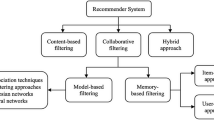Abstract
Implicit feedback, which indirectly reflects opinion through user behaviors, has gained increasing attention in recommender system communities due to its accessibility and richness in real-world applications. A major way of exploiting implicit feedback is to treat the data as an indication of positive and negative preferences associated with vastly varying confidence levels. Such algorithms assume that the numerical value of implicit feedback, such as time of watching, indicates confidence, rather than degree of preference, and a larger value indicates a higher confidence, although this works only when just one type of implicit feedback is available. However, in real-world applications, there are usually various types of implicit feedback, which can be referred to as heterogeneous implicit feedback. Existing methods cannot efficiently infer confidence levels from heterogeneous implicit feedback. In this paper, we propose a novel confidence estimation approach to infer the confidence level of user preference based on heterogeneous implicit feedback. Then we apply the inferred confidence to both point-wise and pair-wise matrix factorization models, and propose a more generic strategy to select effective training samples for pair-wise methods. Experiments on real-world e-commerce datasets from Tmall.com show that our methods outperform the state-of-the-art approaches, considering several commonly used ranking-oriented evaluation criteria.
Similar content being viewed by others
References
Bobadilla, J., Ortega, F., Hernando, A., et al., 2013. Recom-mender systems survey. Knowl.-Based Syst., 46: 109–132. https://doi.org/10.1016/j.knosys.2013.03.012
Freedman, D.A., 2009. Statistical Models: Theory and Practice (2nd Ed.). Cambridge University Press, Cambridge.
Friedman, J.H., 2001. Greedy function approximation: a gra-dient boosting machine. Ann. Stat., 29(5): 1189–1232.
Friedman, J.H., 2002. Stochastic gradient boosting. Comput. Stat. Data Anal., 38(4): 367–378. https://doi.org/10.1016/S0167-9473(01)00065-2
Hu, Y.F., Koren, Y., Volinsky, C., 2008. Collaborative filtering for implicit feedback datasets. Proc. 8th IEEE Int. Conf. on Data Mining, p.263–272. https://doi.org/10.1109/ICDM.2008.22
Koren, Y., 2008. Factorization meets the neighborhood: a multifaceted collaborative filtering model. Proc. 14th ACM SIGKDD Int. Conf. on Knowledge Discovery and Data Mining, p.426–434. https://doi.org/10.1145/1401890.1401944
Koren, Y., 2010. Factor in the neighbors: scalable and accurate collaborative filtering. ACM Trans. Knowl. Discov. Data, 4(1), Article 1. https://doi.org/10.1145/1644873.1644874
Lee, T.Q., Park, Y., Park, Y.T., 2008. A time-based approach to effective recommender systems using implicit feedback. Expert Syst. Appl., 34(4): 3055–3062. https://doi.org/10.1016/j.eswa.2007.06.031
Liaw, A., Wiener, M., 2002. Classification and regression by randomForest. R News, 2(3): 18–22.
Pan, R., Zhou, Y.H., Cao, B., et al., 2008. One-class collabo-rative filtering. Proc. 8th IEEE Int. Conf. on Data Mining, p.502–511. https://doi.org/10.1109/ICDM.2008.16
Pan, W.K., Zhong, H., Xu, C.F., et al., 2015. Adaptive Bayes-ian personalized ranking for heterogeneous implicit feedbacks. Knowl.-Based Syst., 73: 173–180. https://doi.org/10.1016/j.knosys.2014.09.013
Pan, W.K., Liu, M.S., Ming, Z., 2016. Transfer learning for heterogeneous one-class collaborative filtering. IEEE Intell. Syst., 31(4): 43–49. https://doi.org/10.1109/MIS.2016.19
Park, D.H., Kim, H.K., Choi, I.Y., et al., 2012. A literature review and classification of recommender systems re-search. Expert Syst. Appl., 39(11): 10059–10072. https://doi.org/10.1016/j.eswa.2012.02.038
Rendle, S., Freudenthaler, C., Gantner, Z., et al., 2009. BPR: Bayesian personalized ranking from implicit feedback. Proc. 25th Conf. on Uncertainty in Artificial Intelligence, p.452–461.
Ricci, F., Rokach, L., Shapira, B., et al., 2011. Recommender Systems Handbook. Springer, Boston, MA, US. https://doi.org/10.1007/978-0-387-85820-3
Shi, Y., Larson, M., Hanjalic, A., 2014. Collaborative filtering beyond the user-item matrix: a survey of the state of the art and future challenges. ACM Comput. Surv., 47(1): 1–45. https://doi.org/10.1145/2556270
Tuzhilin, A., Adomavicius, G., 2005. Toward the next genera-tion of recommender systems: a survey of the state-of- the-art and possible extensions. IEEE Trans. Knowl. Data Eng., 17(6): 734–749. https://doi.org/10.1109/TKDE.2005.99
Volkovs, M., Yu, G.W., 2015. Effective latent models for bi-nary feedback in recommender systems. Proc. 38th Int. ACM SIGIR Conf. on Research and Development in In-formation Retrieval, p.313–322. https://doi.org/10.1145/2766462.2767716
Wang, J., Lin, L.F., Zhang, H., et al., 2016. Confidence- learning based collaborative filtering with heterogeneous implicit feedbacks. Proc. 18th Asia-Pacific Web Conf., p.444–455. https://doi.org/10.1007/978-3-319-45814-4_36
Wang, S., Zhou, X.B., Wang, Z.Q., et al., 2012. Please spread: recommending tweets for retweeting with implicit feed-back. Proc. Workshop on Data-Driven User Behavioral Modelling and Mining from Social Media, p.19–22. https://doi.org/10.1145/2390131.2390140
Author information
Authors and Affiliations
Corresponding author
Additional information
Project supported by the National Basic Research Program (973) of China (No. 2015CB352400) and the National Key Research and Development Program of China (No. 2016YFB1200203-03)
Rights and permissions
About this article
Cite this article
Wang, J., Lin, Lf., Zhang, H. et al. A novel confidence estimation method for heterogeneous implicit feedback. Frontiers Inf Technol Electronic Eng 18, 1817–1827 (2017). https://doi.org/10.1631/FITEE.1601468
Received:
Accepted:
Published:
Issue Date:
DOI: https://doi.org/10.1631/FITEE.1601468



